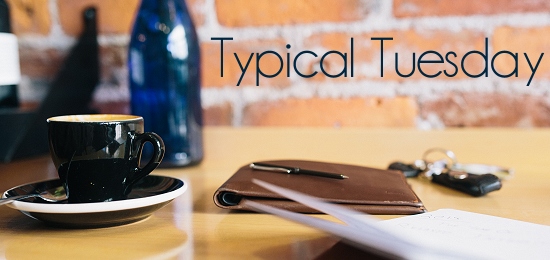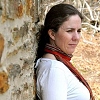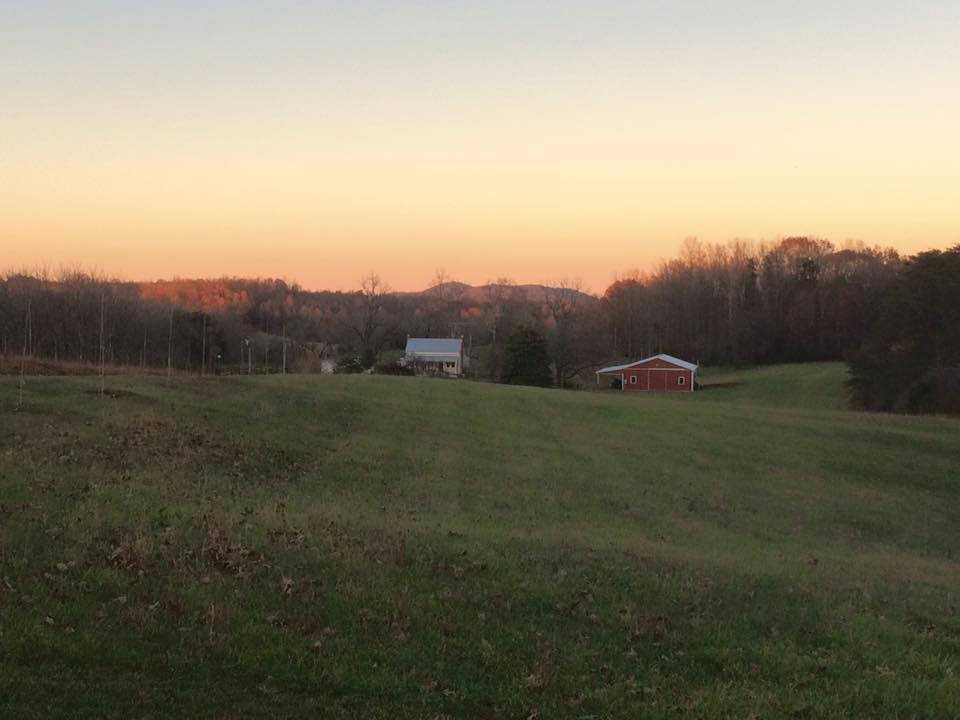
It’s 5am – or 4:50am or 5:11am – and I’m awake. I’m mostly awake because this is the time I typically get up, but I’m also awake because Mosey, our basset hound, typically wakes at this moment and is sharing his joy with me by licking my toes.
I then feed Mosey and Meander, our other hound dog. By then, the coffee is almost done, and I’ve built a fire in these  late spring mornings. I’ve packed my husband’s lunch and washed the few eggs we gathered late last night.
late spring mornings. I’ve packed my husband’s lunch and washed the few eggs we gathered late last night.
By 5:30, I am settled into my grandfather’s tufted leather chair and have my mother’s Bible in hand. A chapter from there. A daily read about fasting that I consider intellectually but not physically. A few prayers jotted into a notebook. Then, I lean back with as many chapters of my book of the morning – at this moment, it’s Christie Purifoy’s Roots and Sky – as time and the chill in the air will allow. These are my quiet moments, my centering moments. The only words that I let precede my own for today.
Here in the cold days, I work from our dining room table. (I’m eager to return to my office in what was the summer kitchen of this 200-year-old farmhouse, but that will call for days of sun that warm the walls.) By 6am, I open my laptop and quickly shut down all the browser tabs I forgot to close last night. I slip open MS word and begin.
I tap words ahead into the rising dawn. I do my best not to change anything, trusting that I’ll see better what needs revision when I have plotted the full path of the book. I resist – mostly – the urge to open one of those browser tabs. I keep going until I reach 1,000 words, the magic number Shawn Smucker suggested to me years ago. When I am in rhythm, this takes less than 20 minutes.
For all intents and purposes then, the most important work of my day is done when I get those 1,000 words finished. That’s not to say what I do for the rest of the day – the edits for clients, the manuscript reviews, the notes to communities I organize and writers I love – is unimportant. But for my mental health, for my clarity of mind, for my ability to speak with integrity about the writing life, those 1,000 words are my bedrock.
I have to say there’s another component of this urgency I have to do my personal creative writing first; it has to do with my identity as a Southern, Christian woman. All three of those aspects of my societal upbringing have taught me – through model and intention – to put myself last, to always do what is most important for others before what I do for myself. And while the central underpinning of those teachings – the lessons about selflessness and the need to avoid selfishness are important – many Southern, Christian women, myself included, have come to believe that we are as always to subjugate our calling, our health, our own needs to the wants of others. So when I do my writing first, I am establishing my own personhood as fundamental to the rest of the work I do. I am important, and those 1,000 words help me remember that.
When my 1,000 words are done, I feed our chickens, goats, cats, and Great Pyrenees and then come in to sit with my husband before he leaves for work. Once his truck pulls out of the quarter-mile drive, I’m back to the laptop – writing email missives to clients and crafting newsletters. Then, I edit or listen to client manuscripts for a few hours before taking a lunch break.
This lunch break thing is new for me. I don’t have colleagues to break with, and I don’t have an hours-per-week expectation set from a boss. Therefore, I don’t have boundaries coming from outside myself, and if I’m not careful, I feel pressured to do more every day. Thus, I never stopped for lunch, powering through until my husband came home and the animals needed another round of food. This continual 10 hours of work – 6am-4pm – not only made me cranky and exhausted, but it also made me frenzied and unable to quit work when the day needed to wind down. My belief that it had to all be done now made my chest ache, and I always felt like time was scarce. Somehow, a lunch break has changed all that.
So I eat lunch and watch a TV show on the DVR – Supernatural is my show of choice at the moment. Nothing like some vampire hunting and some pop religious questioning to give the mind a break.
Then, I go back to work for three or four hours until that truck with my beloved rolls back down the lane.
Feed everyone.
Feed ourselves.
Then, by 6pm, we’re back to something else. My husband is usually in his shop working on a car. Some  evenings I have to work, but I’m making that need more and more rare these days. Instead, I read or listen to podcasts if my energy is still high. As spring comes on, I’ll have garden chores to tend in these hours when the sunshine stretches himself.
evenings I have to work, but I’m making that need more and more rare these days. Instead, I read or listen to podcasts if my energy is still high. As spring comes on, I’ll have garden chores to tend in these hours when the sunshine stretches himself.
Some nights, I’m exhausted and just settle into my recliner – crochet nest nearby – to work on an afghan or stitch a hedgehog. On the days when I’m most tired –usually later in the week – I just watch TV, letting the stories get along without me just fine. (Since I’ve been a full-time editor and writer, I’ve found that I take great comfort – GREAT COMFORT – in the fact that movies and TV shows don’t need my help to get to a resolution. It’s a strange thing to find myself relieved that I don’t have to work out the story myself, and it’s a gift that lets my mind let go of sifting through word choices and point of view strategies. )
9pm means I’m in bed, blankets tucked up to my chin and a book at hand. I’m asleep by 9:30 unless that book is REALLY good . . . and sometime after, my husband and two hound dogs join me under the covers.
It’s not the life everyone would choose, but it’s mine, and it’s so, so good.
Incidentally, this essay is 1001 words. Got my word count in for today. ☺
About the Author: Andi Cumbo-Floyd
 Andi Cumbo-Floyd is a writer, editor, and farmer, who lives on 15 blissful acres at the edge of the Blue Ridge Mountains with her husband, 6 goats, 4 dogs, 4 cats, and 22 chickens. Her books include Steele Secrets, The Slaves Have Names, and Writing Day In and Day Out. You can connect with Andi at her website, andilit.com, or via Facebook and Twitter.
Andi Cumbo-Floyd is a writer, editor, and farmer, who lives on 15 blissful acres at the edge of the Blue Ridge Mountains with her husband, 6 goats, 4 dogs, 4 cats, and 22 chickens. Her books include Steele Secrets, The Slaves Have Names, and Writing Day In and Day Out. You can connect with Andi at her website, andilit.com, or via Facebook and Twitter.


That thing you mention about being a “southern, christian woman”? That’s what I’m noticing in myself – not the same source, but that strange co-dependence on serving everyone else first even if they don’t want me to!
Oh, yeah, I think many women have it, and when we layer on Christian or Southern or any number of other pieces of the forces that shape us, it just deepens the tendency. But yeah, we are worth putting first – not because it’s selfish but because it’s necessary.